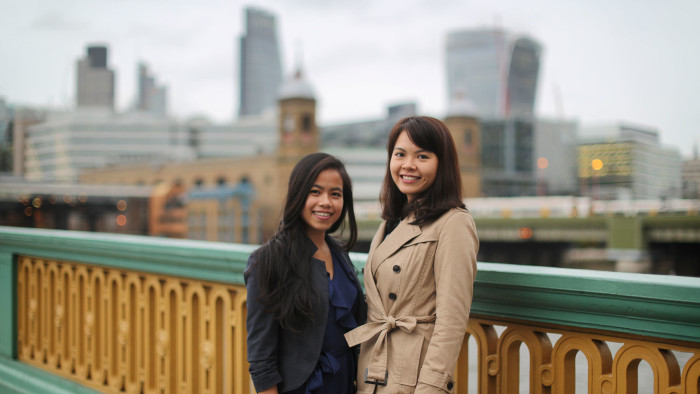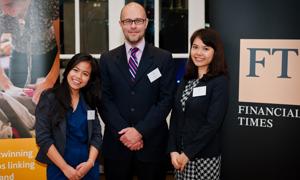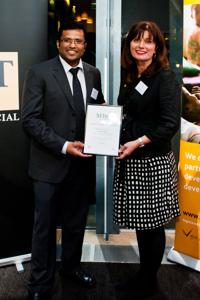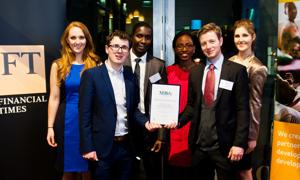FT MBA Challenge 2014 winner announced

Simply sign up to the Business education myFT Digest -- delivered directly to your inbox.
A business plan that proposes how World Child Cancer (WCC) can improve access to affordable, reliable treatment drugs in Ghana has won this year’s FT MBA Challenge.
The team that created the business plan, Doin it for the kids, is made up of students from Duke University’s Fuqua School of Business and Yale University in the US, Esade Business School in Spain, and National University of Singapore Business School. Like their fellow participants, they had to collaborate remotely on problems faced by the FT’s seasonal appeal partner over a period of five months and submit a 12-page business plan.
Allison Ogden-Newton, chief executive of WCC, was one of the judges on the panel. “Doin it for the kids drilled down to understand the difficulties in obtaining drugs in sub-Saharan countries. They gave a practical approach that we will definitely explore,” she says.
The UK-based charity has already increased survival rates for children with cancer in Ghana by training more than 200 professionals. However, much more needs to be done. There is still a stigma around dispensing pain medication in local culture, a shortage of treatment drugs and a lack of funding. Only one supplier is currently approved by Ghana’s food and drug board and while many of the drugs used to treat childhood cancers are relatively inexpensive, the cost is not covered by local government and families struggle to pay.

Applying skills learnt on their MBA courses to tackle these problems, the global student team carried out desk-based research and called a number of experts in the field. They were also mentored by Dr Mike Strange, head of operations for diseases of the developing world at GSK, a science-led global healthcare company.
A referral network for local healers and corporate-sponsored family accommodation were among the five initiatives the global student team ultimately proposed.
“WCC could launch an initiative to provide local healers with enough training regarding cancer symptoms so that they could refer the child to a medical professional if they suspect cancer. The training could also include information regarding the treatment process, the curability of cancer and the affordability of treatment so that the healer can provide that information as well,” the students wrote in their business plan.
For the family accommodation initiative, the team referred to Ronald McDonald House Charities as a successful model to emulate. Through fundraising efforts with McDonald’s fast-food chain, the houses provide shelter and food for children who are being treated at local hospitals and their families. Accommodation fees are waived for those unable to pay.

In second and third place in the challenge came Team Chipo and The Fuqua Scholars respectively. Team Chipo represented students from Thunderbird School of Global Management in the US, the University of Canterbury in New Zealand, Warwick Business School in the UK and Nanyang Business School in Singapore. Their assigned task was to improve access to training local healthcare workers such as paediatric oncologists and their mentor was Dame Clare Tickell, chief executive of Hanover Housing Association, a UK provider of housing and services for people in later life.
The team initially described starting the project enthusiastically but became daunted by the overwhelming odds against paediatric oncology in sub-Saharan Africa. However, they succeeded in expanding the WCC model of twinning partnerships and the transfer of expertise and knowledge.
“Team Chipo presented a really strong business plan that we will definitely follow up on,” says Ms Ogden-Newton.

The Fuqua Scholars represented students studying at the University of Chicago Booth School of Business, Fuqua and University College London, who created a business plan that showed how WCC can implement microfinance solutions in Ghana. Mentored by Paul Martin, chair of the African Development Bank, one of their recommendations was that WCC partner with established Village Savings and Loan Associations (VSLA).
“In a VSLA, money is collected and saved into group funds on a weekly or monthly basis and then members are given a rotational share at the end of the cycle (every eight to 12 months). Members usually contribute as little as $7 a week,” the team explained in their proposal.
The judges felt this was an innovative way to create revenue, recognising the difficulty of building funding from the ground up. Shawn Donnan, FT World Trade Editor also on the panel, noted the depth of research on the market and local situation presented in the business plan.
A special commendation has also been awarded to Team Angel of Hope for the quality of their business plan, which outlined how WCC can raise £1.5m in the UK. The dean of the University of Cambridge Judge Business School Christoph Loch, another judge on the panel, was particularly impressed.
“They have a website working, they have a pragmatic and reasonable business plan and they are trying to link WCC sponsorship into a wider volunteering context. Furthermore, although there is a clear risk that the website will not attract enough interest (identified by them), this could be tested quickly and cheaply (given that they have the website), reducing the risk and making it worth a trial,” he says.
To register interest for the 2015 FT MBA Challenge, which will be in aid of the International Rescue Committee, email mba.challenge@ft.com
Comments